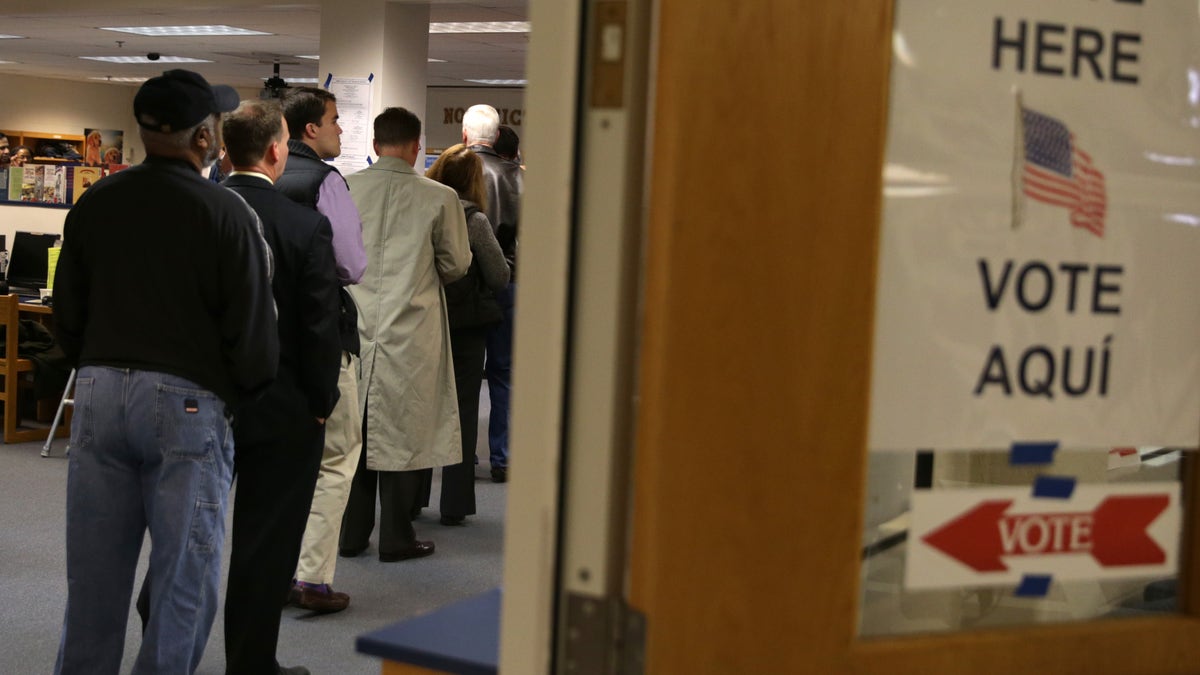
MCLEAN, VA - NOVEMBER 05: Voters line up at a polling station to cast their votes on Election Day November 5, 2013 at Spring Hill Elementary School in McLean, Virginia. Democratic gubernatorial candidate for Virginia Terry McAuliffee is running against Republican Ken Cuccinelli, the current attorney general of Virginia, to succeed Bob McDonnell to be the next Virginia governor. (Photo by Alex Wong/Getty Images) (2013 Getty Images)
According to a recent Harvard University Institute of Politics study, 68 percent of Hispanic millennials would prefer a Democratic win in 2016, compared with 27 percent who favor a Republican win. A Pew Research Center study showed similar numbers after the 2012 election.
While it may be true that large numbers of Hispanics vote for Democrats, liberty-minded candidates should not consider the Hispanic vote as unattainable.
Although current evidence might lead one to believe that the authoritarian regimes being suffered by the people of Cuba, Venezuela and even Argentina are historical norms, the truth is that “liberty is old; it is despotism that is new,” as French historian Madame de Staël sagely noted regarding the rise of absolutism in Europe.
We need to be part of the demographic that elects a politician that stands for limited government and free markets. We are, after all, the original libertarians.
The prevailing Hispanic alignment to the political left is far from set in stone. After all, modern day libertarianism was born, in many ways, in the Iberian Peninsula and followed the conquistadors to the New World. Although some Hispanics might not realize it, a love of liberty is very much a part of our cultural heritage.
To begin with, it is important to define libertarianism and its origins. In The Libertarian Mind, David Boaz defines libertarianism as “the view that each person has the right to live his life in any way he chooses so long as he respects the equal rights of others” and states that “governments should exist to protect rights.”
These ideas are not uniquely American, however. Neither the Founders nor Ron Paul invented liberty. The foundations of libertarianism, or classical liberalism, date back as far as ancient China, Greece and, of course, Spain.
It is no coincidence that the first use of the word “liberal,” the internationally accepted term for a libertarian, was first used in the 1800s in the context of the Spanish struggle for liberation from Napoleon and his absolutist rule. It is not, in fact, an “Anglo” word like some scholars would have you believe.
But the libertarian tradition in Spain begins much earlier than the 19th century; it predates the Enlightenment and even the signing of the Magna Carta.
The Charter of León, issued in 1020 under Alphonso V, for example, granted municipalities judicial and administrative jurisdiction and recognized individual rights. This check of absolute monarchal power was in place 200 years before the signing of the Magna Carta and was considered a precedent for the United States Constitution by many of the Founders, including John Adams.
Centuries later, the School of Salamanca would have similar influence and as former Mont Pelerin Society President Leonard Liggio noted in his essay Liberty and Morality: The Neglected Hispanic Tradition, “modern economics, human rights, and international law were founded in the Iberian universities of the 16th and 17th centuries.”
Latin America, too, played an important role in the development of libertarian thought. The debates over the humanity and rights of Native Americans (think Bartolomé de las Casas) influenced John Locke and the American Founders.
Scholars such as Juan de Mariana, Roberto Bellarmine, and Francisco Suárez, both directly and indirectly, helped shape the minds of the fathers of modern day libertarianism. It is for good reason that F.A. Hayek believed that the Spanish Scholastics were the forerunners of the Austrian School of Economics.
Hispanics today have too often ignored or forgotten our libertarian heritage, but it is undeniably there. Liberty is engrained in our moral and genetic codes, and politicians should do everything in their power to capitalize on that.
Whether we be first, second or third generation immigrants, we should recognize that we are in the United States because of a lack of political and economic freedom in our native countries. We know that authoritarianism and limited market freedom does not work. It is, without a doubt, why my parents and I left Ecuador in the 1990s.
It is for this reason that we must be part of the movement to stop the astronomical growth of government that the Bush and Obama years brought to this country. We need to be part of the demographic that elects a politician that stands for limited government and free markets. We are, after all, the original libertarians.








































